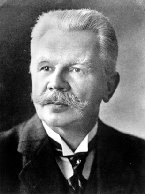Karl Staaff facts for kids
Quick facts for kids
Karl Staaff
|
|
|---|---|
 |
|
| 11th Prime Minister of Sweden | |
| In office 7 November 1905 – 29 May 1906 (Error: Need valid year, month, day) |
|
| Monarch | Oscar II |
| Preceded by | Christian Lundeberg |
| Succeeded by | Arvid Lindman |
| In office 7 October 1911 – 17 February 1914 (2 years, 133 days) |
|
| Monarch | Gustaf V |
| Preceded by | Arvid Lindman |
| Succeeded by | Hjalmar Hammarskjöld |
| Personal details | |
| Born | 21 January 1860 Klara, Sweden |
| Died | 4 October 1915 (aged 55) Engelbreckt, Sweden |
| Political party | Liberal Coalition Party |
Karl Albert Staaff (born January 21, 1860 – died October 4, 1915) was an important Swedish politician and lawyer. He believed in liberal ideas, which focus on individual rights and freedoms. Staaff was the leader of the Liberal Coalition Party from 1907 to 1915.
He served as the Prime Minister of Sweden two times. His first term was from 1905 to 1906, and his second was from 1911 to 1914. During his time as Prime Minister, he worked hard to make Sweden a more fair and modern country.
Contents
Working for Voting Rights
Karl Staaff was a strong supporter of universal suffrage in Sweden. This means he wanted everyone to have the right to vote, not just a few wealthy men. At the time, only a small part of the population could vote.
In 1905, as Prime Minister, he tried to introduce a law that would give all men equal voting rights. This was a big step towards a more democratic Sweden. Even though his attempt didn't fully succeed right away, his efforts paved the way for future changes.
His successor as the Liberal party leader, Nils Edén, later managed to make universal suffrage a reality. By 1918–1919, voting rights were extended to all adults, including women. This was a huge victory for democracy in Sweden.
Standing Up for His Beliefs
In 1914, Karl Staaff resigned from his position as Prime Minister. This happened after a disagreement about defense policies. A group of farmers held a demonstration at the Royal castle in Stockholm.
During this event, King Gustaf V spoke out against Staaff's defense plans. This was unusual because the King was supposed to stay out of political matters according to Swedish law. Staaff felt that the King's actions went against the rules, so he stepped down in protest. This event is known as the Courtyard Crisis.
Staaff's Legacy
Today, the Swedish Liberal party, known as The Liberals, sees Karl Staaff as one of their most important early leaders. He helped shape Swedish liberalism in the 20th century. Other notable leaders who followed him include Nils Edén, Carl Ekman, and Nobel Prize winner Bertil Ohlin.
Staaff's work helped lay the foundation for a more democratic and equal society in Sweden. His dedication to voting rights and his willingness to stand up for his principles left a lasting impact.
Images for kids
See also
 In Spanish: Karl Staaff para niños
In Spanish: Karl Staaff para niños
 | Claudette Colvin |
 | Myrlie Evers-Williams |
 | Alberta Odell Jones |


